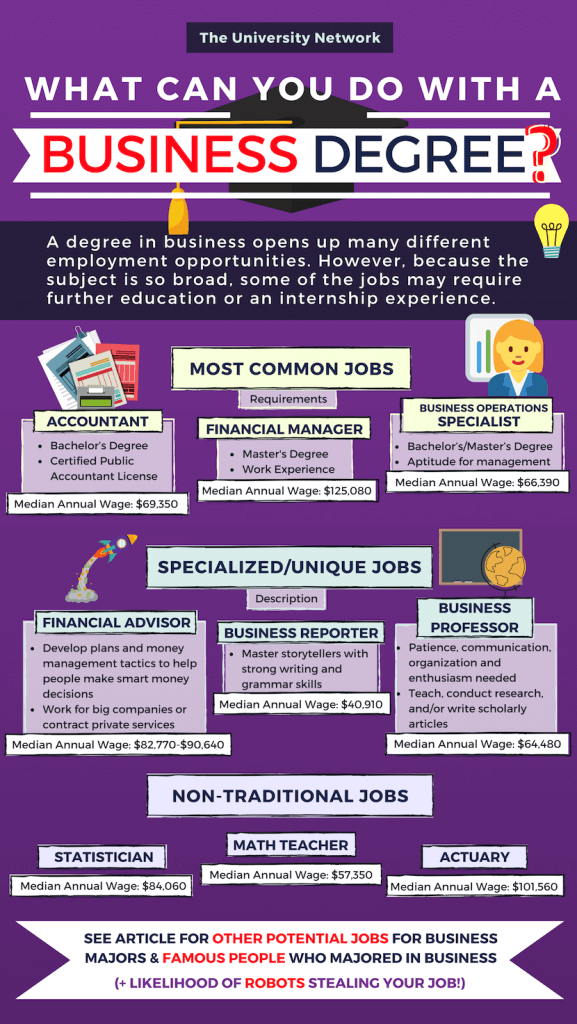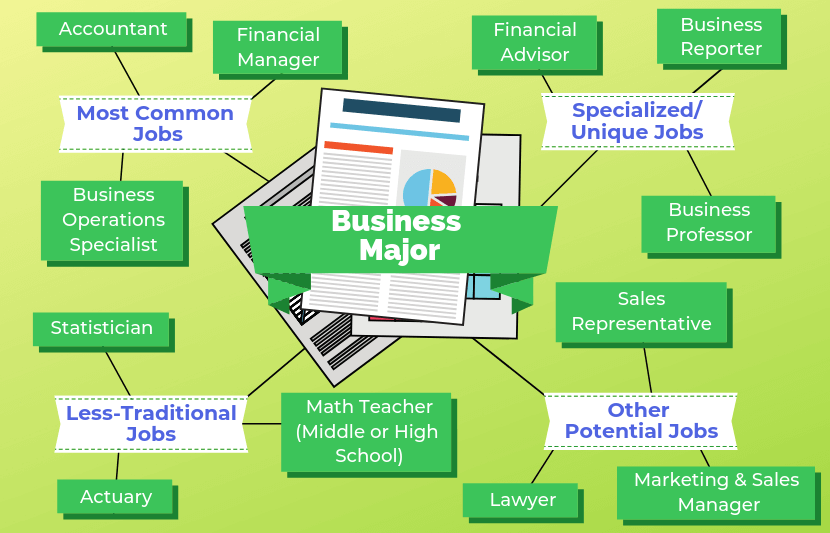What You Can Do with a Business Degree
If you’re good with numbers, and/or have any interest in understanding the inner workings of companies, a business degree is the right choice for you. A business degree opens up many different employment opportunities. However, because the subject is so broad, some of the jobs you could earn may require further, more specialized education beyond a business degree. Sometimes, it is best to specialize your skill set by taking on an internship or part-time job before applying to full-time positions.
Here is a list of 12 possible jobs for business majors:
Common Jobs For Business Majors
1. Accountant

Accountants keep track of, analyze and archive an organization’s financial information. Depending on the size of the organization, accountants are also sometimes asked to give advice on how an organization should budget, spend and invest its money. Nearly every organization needs accountants, including hospitals, nonprofits, insurance firms and more. After completing a bachelor’s degree, aspiring accountants should become state-certified by passing the Certified Public Accountant exam, which is administered by the American Institute of Certified Public Accountants.
Median annual wage: $69,350
Common entry-level degree: Bachelor’s degree & CPA license
Likelihood that robots will take your job: 94%
2. Financial Manager

Some of the day-to-day tasks of financial managers might overlap with accountants, but there is one key difference between the two jobs. Financial managers are supposed to plan for future financial endeavors, while accountants are more regularly required to analyze and share past financial information with a company. In smaller organizations, one person may be required to do both jobs. Most financial managers have a master’s degree and a significant amount of work experience within the field of finance.
Median annual wage: $125,080
Common entry-level degree: Master’s degree
Likelihood that robots will take your job: 7%
3. Business Operations Specialist

Business operations specialists are often tasked with the broad assignment of optimizing the flow of a company by analyzing day-to-day business operations and improving company-customer relations. It is a job best fit for those who are comfortable in a managerial position — those who are able to think broadly and focus on the big picture.
Median annual wage: $66,390
Common entry-level degree: Bachelor’s/Master’s degree
Likelihood that robots will take your job: 23%

Specialized, Unique Jobs for Business Majors
4. Financial Advisor

Financial advisors most often develop plans and money management tactics to help individual people make smart decisions with the money they make. They evaluate a person’s income, savings and interests to try to help them get the most out of their money. Sometimes they work for big companies, and other times they can contract their services out privately. If a financial advisor is dealing with clients who possess large sums of money, he or she may be referred to as a wealth manager.
Median annual wage: $82,770-$90,640
Common entry-level degree: Bachelor’s/Master’s degree
Likelihood that robots will take your job: 58%
5. Business Reporter

Technically, there is no required degree to become a reporter, but you will have a hard time finding a job without one. Skilled reporters are master storytellers with strong writing and grammar skills. To learn the essential skills, most aspiring reporters study journalism in college. However, a business degree can give a business reporter an edge over his or her colleagues who only studied journalism, as long as his or her writing skills are also solid.
Median annual wage: $40,910
Common entry-level degree: Bachelor’s degree
Likelihood that robots will take your job: 11%
6. Business Professor

Patience, communication, organization and enthusiasm are some of the most important characteristics of a good college professor. To earn a job teaching at the post-secondary level, a master’s degree (and sometimes a doctorate degree) is required. In addition to teaching, some college professors also conduct research and write scholarly articles.
Median annual wage: $64,480
Common entry-level degree: Master’s degree
Likelihood that robots will take your job: 3%
Less-Traditional Jobs For Business Majors
7. Statistician

Traditionally, to become a statistician, one would major in math or statistics, but that doesn’t mean your business degree isn’t worth anything. While some statisticians are hired to create polls and manage data for political campaigns or the government, others are hired by business corporations and those in the manufacturing sector. However, if you majored in business, you might want to seek further education geared towards statistics and mathematics.
Median annual wage: $84,060
Common entry-level degree: Master’s/Doctorate degree
Likelihood that robots will take your job: 22%
8. Math Teacher (middle or high school)

After earning a bachelor’s degree, those who aspire to teach in middle or high schools have to complete an internship in a school classroom, pass the state-required test for teachers and receive a teaching certificate/license.
If you are dead set on being a teacher, the best advice would be to major in education. But if you’re still uncertain about what you want to do, a business degree could ultimately help you land a job teaching math. As long as your degree is in a related field to the classes you aspire to teach, you will be okay.
Median annual wage: $57,350
Common entry-level degree: Bachelor’s degree & teaching certificate
Likelihood that robots will take your job: 0%
9. Actuary

Actuaries may have similar responsibilities to accountants, as they both are part of a company or organization’s finance department. But while accountants spend more time drafting financial reports on past spendings, actuaries assess and manage risk of future investments and spendings. To become an actuary, you need a bachelor’s degree in a related field, which could be business, economics, accounting etc., and you have to pass certification exams. Professional actuaries should be certified through the Casualty Actuarial Society (CAS) or the Society of Actuaries (SOA). Both groups have a unique set of tests you have to pass. If you recently graduated from college and want to become an actuary, now is the time to start preparing for those tests. They can take hundreds of hours to prepare for.
Median annual wage: $101,560
Common entry-level degree: Bachelor’s degree & actuary certification
Likelihood that robots will take your job: 21%
Other Potential Jobs For Business Majors
10. Marketing & Sales Manager

Marketing and sales managers are generally asked to oversee a team of employees, develop goals and marketing plans, and gauge their company’s customers in order to target them effectively. For marketing and sales managers to be successful, they typically need to develop empathy skills and stay up to date on the trends that shape their company’s target audience. This profession doesn’t require as much number crunching as some of the other jobs on this list, but it requires broad, critical thinking skills. Likely, you will need further, more specialized education to land this job.
Median annual wage: $125,290
Common entry-level degree: Bachelor’s degree
Likelihood that robots will take your job: 1%
11. Sales Representative

Business majors often possess a passion for finding ways to sell a product, which translates perfectly to sales. Requirements vary from company to company, but good sales people should be able to speak comfortably with anyone at any time. Because sales jobs often involve cold calls, good sales people should also be able to quickly bounce back from rejection.
Median annual wage: $52,460 (varies heavily)
Common entry-level degree: High School diploma/Bachelor’s degree
Likelihood that robots will take your job: 85%
12. Lawyer

Some business majors go on to become lawyers. Generally, if you want to become a lawyer, you will also have to pass the Law School Admissions Test (LSAT), apply to law school, earn a Juris Doctor degree and pass the Bar examination — all before you can begin to practice law. Generally, it takes 3 years to graduate from law school, so the entire process takes 7-8 years. However, some universities, such as Duke, offer a joint program in which you can receive your Business degree and Juris Doctor degree within 4 years.
Median annual wage: $119,250
Common entry-level degree: Juris Doctor degree
Likelihood that robots will take your job: 4%
Conclusion
A business degree is a versatile qualification that equips graduates with a broad skill set applicable to various roles in the corporate world, particularly in marketing management, project management, human resources, and more. A business degree provides a strong foundation that enhances employability and career advancement by covering essential subjects such as marketing principles, finance, management, and economics. For aspiring marketing managers, a deep understanding of consumer behavior, market research, and advertising strategies is crucial for designing effective marketing campaigns, especially in today’s data-driven environment. Similarly, a management consultant benefits from a solid grasp of business operations and strategic planning, making a management consultant vital for helping organizations improve efficiency and profitability. In project management, knowledge of project planning, risk management, and budgeting enables graduates to oversee complex projects effectively. Furthermore, in human resources, understanding organizational behavior, employment law, and talent management is critical for managing workforce dynamics.
In addition to technical knowledge, business degrees foster essential soft skills such as communication skills, leadership, teamwork, and critical thinking. Effective communication is crucial in marketing, consulting, and HR roles, and business programs emphasize presentations, teamwork, and writing skills, preparing graduates to convey ideas clearly. Group projects help develop leadership abilities and the capacity to collaborate with diverse teams, both of which are key attributes for managing campaigns and projects. Business education encourages analytical thinking, enabling graduates to identify issues, evaluate solutions, and make informed decisions, which is vital in consulting and project management.
Networking opportunities provided by business schools also play a significant role in career success. Practical experience gained through internships can enhance a resume and provide insight into the marketing field or consulting practices, making graduates more attractive to employers. Access to mentors in the industry can guide career choices and provide valuable advice on navigating the job market, while strong ties between business programs and companies often facilitate job placements for graduates.
Moreover, a business degree can be supplemented with specializations or certifications that further enhance job prospects. For example, certifications in digital marketing are increasingly valuable for marketing manager positions as the field shifts online. Similarly, obtaining a Project Management Professional (PMP) certification can significantly boost appeal in project management roles, demonstrating commitment and expertise. In human resources, certifications like SHRM or PHR showcase knowledge and proficiency in HR practices.
Graduates with a business administration degree enjoy a multitude of benefits that enhance their career prospects and personal development. Firstly, the comprehensive curriculum equips students with essential skills in areas such as finance, marketing, management, and operations, providing a well-rounded foundation that is applicable across various industries. This broad knowledge base allows graduates to adapt to different roles, whether in corporate settings, non-profits, or entrepreneurial ventures. Furthermore, business administration programs often emphasize critical soft skills, including communication skills, leadership, and teamwork, which are crucial for success in any professional environment. Graduates are trained to collaborate effectively and lead diverse teams, making them valuable assets to employers. Additionally, many business administration programs offer networking opportunities through internships, alumni events, and partnerships with local businesses, helping graduates build connections that can lead to job placements and mentorship. These practical experiences not only enhance resumes but also provide real-world insights that are invaluable in today’s competitive job market. Moreover, the degree can be further complemented by specializations or certifications, such as digital marketing or project management, allowing graduates to tailor their skills to specific career paths, such as a marketing manager. Lastly, the analytical and problem-solving skills developed throughout the program prepare graduates to tackle complex challenges in the workplace, fostering a mindset geared toward innovation and strategic thinking. Overall, a business administration degree not only opens doors to diverse career opportunities but also equips graduates with the skills and knowledge needed to thrive in a rapidly changing business landscape.
Finally, the adaptability cultivated through a business education prepares graduates to thrive in an evolving business landscape. Programs often cover current trends in technology and consumer behavior, allowing graduates to adjust marketing strategies and management practices accordingly. A global perspective integrated into many business degrees is also crucial in today’s interconnected economy, benefiting roles that require cross-cultural awareness. In summary, obtaining a business degree significantly enhances career prospects in various fields, preparing graduates to lead and innovate in their respective industries.
10 Famous People Who Studied Business
1. Cate Blanchett
2. George W. Bush
3. Shaquille O’Neal
4. Clint Eastwood
5. John Elway
6. Mick Jagger
7. Arnold Schwarzenegger
8. Rachel Stevens
9. Wanda Sykes
10. Tiger Woods
To explore options for other majors, click here.



